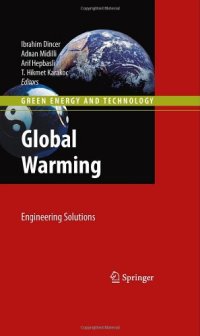
Ebook: Global Warming: Engineering Solutions
- Genre: Technique
- Tags: Renewable and Green Energy, Sustainable Development, Environmental Engineering/Biotechnology, Thermodynamics, Climate Change, Renewable and Green Energy
- Series: Green Energy and Technology
- Year: 2010
- Publisher: Springer US
- Edition: 1
- Language: English
- pdf
Global Warming: Engineering Solutions goes beyond discussing the definition and causes of climate change, and offers concrete solutions for solving global warming. Innovative and forward-thinking engineering solutions are needed to tackle global warming’s threat to the planet, and this book offers numerous methods to address global warming’s identified causes.
Drawing upon the collective knowledge of renowned experts, Ibrahim Dincer, Arif Hepbasil, Adnan Midilli and T. Hikmet Karakoc have assembled a wide ranging treatise on engineering solutions to global warming that includes:
- Ideas for correcting carbon dioxide and other emission pollution
- Exploring the relationship between global warming and thermodynamics
- Examining the sustainability and practicality of the most prevalent forms of clean energy.
Global Warming: Engineering Solutions explores the major threats of global warming from an engineering perspective, explicating practical deployments of systems that could be implemented and work towards staving off global climate change. This book is a must-read for any researchers and engineers interested in gaining an applicable knowledge of how to prevent and control global warming through engineering.
Global Warming: Engineering Solutions goes beyond the discussion of what global warming is, and offers complete concrete solutions that can be used to help prevent global warming. Innovative engineering solutions are needed to reduce the effects of global warming. Discussed here are proposed engineering solutions for reducing global warming resulting from carbon dioxide pollution, poor energy and environment policies and emission pollution. Solutions discussed include but are not limited to: energy conversion technologies and their advantages, energy management and conservation, energy saving and energy security, renewable and sustainable energy technologies, emission reduction, sustainable development; pollution control and measures, policy development, global energy stability and sustainability.